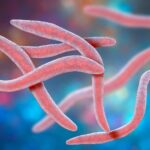What is already known
By being resistant to digestion by the host, microbiota-accessible carbohydrates, or MACs, become prebiotics that gut microbes ferment or metabolize into beneficial compounds such as short-chain fatty acids. But little is known about how each MAC influences the gut microbiota and regulates host physiology.
What this research adds
Working in mice, researchers found that two MACs, L-arabinose and sucrose, act together on the gut microbiota, preventing obesity. L-arabinose, which reduces the absorption of sucrose in the gut, seems to increase the levels of bacteria that produce the short-chain fatty acids acetate and propionate, while sucrose boosts the production of these molecules.
Conclusions
The findings suggest that each MAC has specific effects on gut microbes that may influence host’s health.
By being resistant to digestion by the host, microbiota-accessible carbohydrates, or MACs, become prebiotics that gut microbes transform into beneficial compounds. New research in mice suggests that each MAC has specific effects on gut microbes that may prevent diet-induced obesity.
The findings, published in Cell Reports, could pave the way for new approaches that use specific MACs to modulate the gut microbiota and improve host’s metabolic function.
“MACs represent the major energy source for specific gut microbes, which ferment MACs into various metabolites, including short-chain fatty acids that can be beneficial to the host and suppress the development of disease,” the researchers say.
Because gut microbes differ in their ability to use MACs as fuel, how these carbohydrates influence the microbiota and thus host’s health may vary. What’s more, little is known about the effects of each MAC on gut microbes and host’s metabolism.
To address this question, a team of researchers led by Yun-Gi Kim at Keio University set out to investigate the effects of two MACs, L-arabinose and sucrose, on obesity and gut microbiota in mice.
L-arabinose is a carbohydrate extracted from plants and is used as a natural sweetener and food additive. It reduces the absorption of sucrose in the gut, lowering sugar levels in the blood after a meal. Recent research has also showed that L-arabinose modulates the gut microbiota composition and eases symptoms of gut inflammation in mice.
Concerted action
The researchers gave sucrose in the presence or absence of L-arabinose to mice that had fasted for 24 hours. Then, they measured the animals’ blood glucose levels 15, 30 and 45 minutes later. Sucrose levels were lower in mice that received L-arabinose compared to those that didn’t.
Mice on a high-fat diet that received L-arabinose gained less weight and had lower blood cholesterol levels than those that didn’t receive L-arabinose. Dietary supplementation with L-arabinose also improved glucose tolerance, the researchers found. However, L-arabinose had beneficial effects against diet-induced obesity only in the presence of dietary sucrose.
Supplementation with L-arabinose also appeared to have effects on the gut microbiota: it increased the levels of Bacteroides and Bifidobacterium, two types of bacteria that are negatively correlated with body-weight gain.
Anti-obesity effects
To test whether the levels of specific gut microbes were sufficient for the beneficial effects of L-arabinose on obesity, the researchers colonized germ-free mice with Bacteroides acidifaciens, whose levels were increased in response to L-arabinose, or Escherichia coli as a control. Then, they fed the animals a high-fat diet.
Compared to controls, mice colonized with B. acidifaciens gained less weight and had better glucose tolerance when treated with L-arabinose, the researchers found.
Further experiments showed that L-arabinose increased the levels of bacteria that produce the short-chain fatty acids acetate and propionate, while sucrose acted in concert by boosting the production of these molecules.
“The present study demonstrated that L-arabinose and sucrose cooperatively act on specific bacteria, such as Bacteroides, which in turn synergistically increase the concentrations of acetate and propionate in the intestine and prevent diet-induced obesity,” the researchers say.











